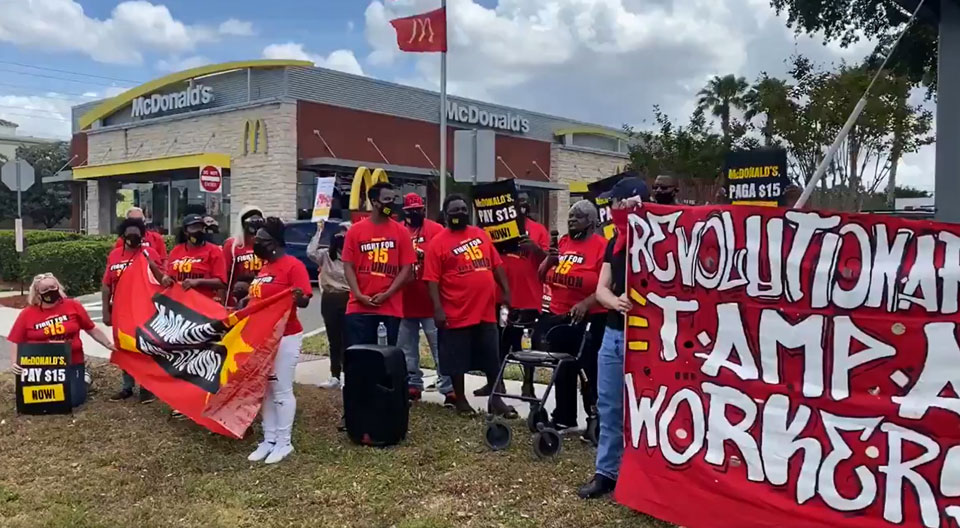
Thousands of McDonald’s workers in at least 15 cities from coast to coast, plus progressive supporters elsewhere, were forced to strike May 19 for $15 an hour and a union—again.
Workers walked out in New York, Chicago, Los Angeles, Orlando, Fla., Raleigh-Durham, N.C., Houston, and nine other cities. Sen. Bernie Sanders, Ind-Vt., Rep. Alexandria Ocasio-Cortez, D-N.Y., and Service Employees President Mary Kay Henry addressed them virtually via zoom.
“We’re going to keep going until we win $15. We’re going to keep fighting until we win a union!” Henry and Ocasio-Cortez jointly tweeted before they spoke.
And supporters, led by the Our Democracy movement and People’s Action, joined the crusade elsewhere, including a demonstration in D.C., demanding congressional Democrats, whom the workers helped put in power last November, stand up for them now.
The McDonald’s workers immediate target was the firm’s May 20 shareholders’ meeting in Chicago. There, its new CEO, who earned 470 times the $27,000 average pay for a McDonald’s worker last year, was expected to brag about the fast food giant’s $4.7 billion in profits in 2020.
The longer range target, which was the point of the D.C. demo, was to get Congress to raise the federal minimum wage to $15 an hour, even though backers there said that’s a compromise. That’s because $15 is not enough to pay for rent for a decent apartment in almost all of the country.
The labor-backed $15 and a union movement, which started a decade ago in fast-food restaurants in New York, called the forced strike. To put the $15 in perspective, the federal minimum is now $7.25 an hour and it hasn’t gone up since the GOP George W. Bush administration.
Pay level so low
That pay level is so low that more than half the states, including red states such as Florida and Arkansas, have enacted their own higher minimums.
The minimum for tipped workers, $2.13 an hour, hasn’t risen in almost a quarter of a century. Bosses are supposed to make up the difference between tips and the regular minimum wage in each state or city but often flout the law.
And the workers who often get shafted by such wage theft–$750 million yearly in fast food, construction, retail, and elsewhere in Colorado alone—are usually workers of color.
“As underpaid workers, we know what it’s like to struggle to get by. We can barely pay our bills and put food on the table for our families. McDonald’s answer? Go on food stamps,” Fight for $15 said on its website fact sheet.
“We’re robbed on the job by our employers looking to cut corners. And it’s not like our employers are struggling. These are multi-billion dollar corporations.”
“The horrible pandemic shows we have to pay a decent wage for decent work,” Ed Lazere, former director of the progressive D.C. Fiscal Policy Institute added. “A $15 an hour wage is the minimum the nation can for workers who do some of the hardest jobs in the country.”
“On top of it all, even McDonald’s knows it takes $15/hr to get by,” because its raised wages to that level at the few restaurants it outright owns, rather than franchises,” $15 and a union said on its website.
“We work hard and we’re still stuck in poverty. It’s not right. That’s why we fight back.”
“We were in the same situation 50 years ago, overworked and underpaid,” Postal Workers member Aaron Brown told the D.C. rally. Then, many if not most U.S. Post Office employees needed food stamps and other federal aid to try to make ends meet, just as McDonald’s workers do today.
The workers’ answer was the famous nationwide 1970 postal strike. Its result was legislation, the Postal Reform Act, making USPS into an independent entity and giving workers the right to organize and bargain. And they got living wages, too. Some 92% of USPS workers are unionists.
“We’re here to support Fight for 15 and a union,” Brown added. “You get $15 an hour if you work” for government contractors, including McDonald’s eateries on military bases. “But you don’t get benefits. With a union, you get better benefits and better working conditions, too.”
Raising wages to $15 an hour would not only benefit thousands of McDonald’s workers but also taxpayers, other D.C. speakers said. That’s because workers forced to toil at the minimum wage, for McDonald’s, Walmart and elsewhere, must turn to federal food stamps, housing vouchers, Section 8 subsidies, and Medicaid to survive.
Money for those programs comes out of taxpayers’ pockets, said Joseph Geevarghese, Our Revolution’s executive director—which means taxpayers are subsidizing those multibillion-dollar corporations. Meanwhile, “There’s increased poverty because employers pay so little,” said Hal Ginsberg, Our Revolution’s D.C. regional organizer.












Comments